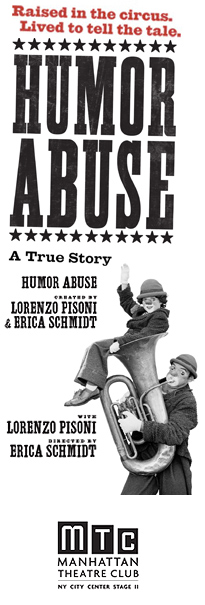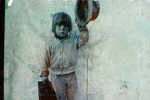
| Home | The Play | Creative | Gallery | Circus | News/Media | Tickets |
| NEWS/REVIEWS | ||||||||||||||||||||
Interview with Lorenzo Pisoni and Erica Schmidt Lisa McNulty: How did your collaboration start? Erica Schmidt: We met at Vassar College. We only had one class together. It was art history. Lorenzo Pisoni: And we only did one show together. That was really the first time that we worked together. LM: You were an actor in college? LP: Not really. The only reason I’m an actor – I say this a lot – is because of Erica. That’s it. ES: We have a friend in common. Johnny Giacalone. He was playing Romeo in ROMEO AND JULIET, which is the first play I directed. I called Lorenzo – you were in Vegas at the time – and asked if he would come be in it. And that was your first time acting. I gave him his first non-clowning job. And his second. And third. And fourth. LM: When you met in college did you immediately find kindred spirits in each other, artistically? LP: No. It really wasn’t until ROMEO & JULIET. ES: We work well together. It’s like, we’re really good in a grocery store together. We can get it done. It’s similar to work. LP: Our work process is like being in the grocery store. We have a cart. There are aisles. We just fill it up. LM: When you first started working together, how did you discover this unusual history that Lorenzo has? ES: He didn’t used to talk about it very much. LP: In fact, I tried to keep it totally under wraps. ES: Part of what I love about directing is figuring out what people are good at and allowing that to shine. That’s how we developed this. I’d ask, “What can you do?” and he’d say, “I can… tap dance as a gorilla.” “It’s in!” LP: Erica’s very physically attuned. Even the way stuff is blocked when we’re doing a more straight play. That makes a lot of sense for me. I think that’s one reason that it’s easy for me to work with her. ES: Other people have a hard time? LP: Yeah, I’m a nightmare. LM: How did the idea for HUMOR ABUSE come about? LP: The idea was for this show that I did with a clown partner, Jonah Hoyle, whose father was one of my father’s clown partners. He also grew up with the Pickle Family Circus, but he wasn’t on tour as much. He was the kind of kid who’d say “I’m cold!” And they’d say “Well, put on a sweater.” And he’d put a sweater on and say “Now I’m itchy!” “So, take the sweater off.” “Now I’m cold!” He was a difficult little kid, but he was incredibly funny. So, we had this idea of doing a show kind of about clowning and kind of about our fathers. He actually coined the phrase “humor abuse.” ES: But it was a variety act. Jonah and Lorenzo only told one story each and the rest was the commedia and dance and clowning. LP: Erica saw it and started laughing at one point. We had a bit in which we would kick somebody out for doing something wrong, and Erica thought that was very funny. She has this really infectious laugh. We couldn’t keep a straight face. So, Jonah kicked her out. ES: I snuck back in. LP: We abused her in front of a full house. That was her first introduction to the show. ES: I thought it was fantastic. It was like nothing I’d ever seen. LP: I tried to get Jonah to come to New York, because I wanted to do the show again, but Jonah’s developed an extreme case of stage fright. And he lives in Alaska. He’s a writer. An amazing writer. He said, “You should just do a solo show.” I thought that was terrifying, but I said okay. LM: How did the show change when you adapted it from the two-person, physically based version to this one-person, story based version? LP: It’s entirely different. One of the first things Erica did, the first time we got together to work, was she took the script and some things I guess I supplemented, and she took the pages and cut them with scissors, put them out on the floor in a new order and we literally walked through the script. It was so incredible. She found the story. She said, “This is a story of father and son. That’s what you’re talking about.” ES: The O’Neill gave us a week in a space, which was really generous. Lorenzo had some ideas of bits – like you’d never tried “High Dive,” but you had this idea for it. And then stories. That stuff had to be pieced together. And then the physical training… LM: HUMOR ABUSE is this wonderful entertainment, but it’s also very personal. It’s Lorenzo’s life. Has that process of building the show been difficult? ES: I write from Lorenzo’s point of view. LP: She does! I say things and they show up in the script, and I’m like “I have to be careful what I say!” ES: But you also say things in a certain way. I always remember art history. We had this very young, hot teacher and she would call on you a lot and almost every class you would say, “That work of art has a certain je ne sais quoi.” LP: I wouldn’t say that every class! ES: All the time! LP: I said it one time and you gave me a hard time about it and I never said it again! ES: But that is in your writing. So, I’ll give him an assignment. “Write four stories about the time you were ten to fourteen.” He’ll write these huge, epic stories, but sometimes the actual heart of it is missing. So, I’ll edit them and write what I assume to be the heart and just give it to him. And he either says yes or no. LP: We know each other so well that it’s not scary. The process hasn’t been scary. The being in front of an audience? That’s gonna be a little scary. LM: You’ve performed in Stage II before. How do you feel about returning to that space? LP: Last time I was in that space (MTC’s 2003 production of Marsha Norma’s LAST DANCE), I kind of felt like a piece of meat. So, it’s kind of nice to be back and not feel like that. ES: Were you wet in addition to naked? LP: I was not naked, but I was wet and I had to walk through the audience. And David Rasche, bless him, would wait for his first line to let me stew a bit. LM: You are wearing a bathing suit in this show… LP: But I’m also wearing flippers. It’s a little different. ES: It’s not flattering. LP: It’s not flattering. But I think the intimacy of the space is going to lend itself to this show. ES: We’ve only run it twice with audiences in tents. The expectation here is different, and ultimately, we’re trying to do the play, a piece of theater. So, this feels exciting. LM: You’re developing this piece right now while Lorenzo is performing another show (Lorenzo is currently playing Nugget in the Broadway production of EQUUS). Is it hard to separate those two things, both as a creative team and a performer? LP: It’s such a good problem to have. I wish, at times, that I didn’t have to break up the week, that we could really get a flow going. But, it doesn’t seem too bad. LM: And preserving yourself physically is also a demand right now? LP: There’s that. But that’s okay, too. I just have to be conscious of it. I sit down a lot more than I used to backstage. ES: I’m glad to hear that! LM: If you were going to tell our audiences one thing about HUMOR ABUSE, as a creative team, what would you tell them about the play? ES: It has a certain je ne sais quoi. |
||||||||||||||||||||




